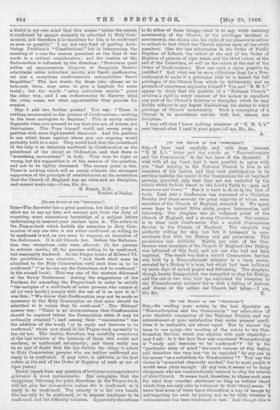[To ens Earros or Ttrs " §PronTOT1.1
SX1tr•-The Spectator has a great position, but that (if you will allow me to say so) does not exempt you from the duty of acquiring some elementary knowledge of a subject before undertaking to instruct your readers upon it. The rubric in the, Prayer-hook which forbids the reception to Holy Com- munion of any one who is not either confirmed or willing to be confirmed is not as you seem to suppose, an invention of the Reformers. It is old Church law. Before the Reforma- tion two exceptions . only were allowed : (1) for persons in articulo 'mortis (2) for persons willing to be confirmed, but reasonably hindered. In the Prayer-books of Edward VI. the prohibition was absolute : " And theft shall none be admitted to the Holy Communion until such time as he be confirmed " (" as he can say the Catechism and be confirmed" in the second book). This was one of the matters discussed at the Savoy Conference. Among the suggestions of the Puritans for amending the Prayer-book in order to satisfy " the scruples of a multitude of sober persons who cannot at all (or very hardly) comply with the use of it as now it is" was this : "We desire that Confirmation may not be made so necessary to the Holy Communion as that none should he admitted to it unless they be confirmed." The Bishops' answer was : "There is no inconvenience that Confirmation should be required before the Communion when it may be ordinarily obtained "; and among their "concessions" was the addition of the words " or be ready and desirous to be confirmed," which now stand in the Prayer-book agreeably to the old law. The matter, therefore, was carefully considered at the last revision at the instance of those who would not conform, or cqnformed reluctantly ; and there really can be no sort of doubt that the law forbids the clergy to admit to Holy Communion persons who are neither confirmed nor ready to be confirmed. (I may refer, in addition, to the first rubric at the end of the Order of Baptism of such as are of riper years.)
Surely (apart from any question of law) your correspondent's grievance is moat miressonsble. She complains that the clergyman, following the plain directions in the Prayer-hook, will not give her communion unless she is confirmed, or is ready to be confirmed. The remedy is in her own hands. She has only to be confirmed, or to express readiness to be confirmed, and the difficulty vanishes. Apparently she refuses
to do either of these things,—that is to say, while claiming • membership of the Church, or the privileges incident to membership, she claims also the right at her pleasure to refuse to submit to that which the Church enjoins upon all her adult members. (See the last exhortation in the Order of Public Baptism of Infants, the rubric at the end of the Order of Baptism of persons of riper years, and the third rubric at the end of the Catechism, as well as the rubric at the end of the Order of Confirmation.) How can such a claim possibly be justified P And what can be more ridiculous than for a Non- conformist to make it a grievance that be is denied the full privileges of the Church from which he deliberately, and on grounds of conscience, separates himself P You and "E. M. L." appear to think that the position of a "National Church" involves a right in every member of the nation to repudiate any part of the Church's doctrine or discipline which be may dislike without in any degree diminishing his claims to every privilege of Church membership. Such a conception of a Church is in accordance neither with law, reason, nor scripture.
I may add that I know nothing whatever of "E. M. L.' case beyond what I read in your paper.--I am, Sir, &Ea,
4..






































 Previous page
Previous page